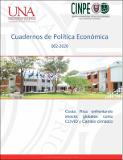| dc.contributor.author | Garro Molina, Francisco | |
| dc.contributor.author | Salazar Torres, Mariano | |
| dc.contributor.author | Castro Salazar, René | |
| dc.date.accessioned | 2020-06-26T17:53:07Z | |
| dc.date.available | 2020-06-26T17:53:07Z | |
| dc.date.issued | 2020-06 | |
| dc.identifier.issn | 22154159 | |
| dc.identifier.uri | http://hdl.handle.net/11056/17665 | |
| dc.description.abstract | El presente documento de trabajo está dividido en dos secciones principales, cada una dedicada a uno de los shocks globales. La primera parte examina las posiciones de los países hacia la COVID 19, discutiendo los enfoques de política para el problema. La segunda sección compara las políticas públicas adoptadas por Costa Rica para combatir el cambio climático.
A través del manuscrito se analiza el caso de Costa Rica y se presenta de manera hipotética la forma que tomaría la curva para enfrentar shocks globales como el COVID 19 y el cambio climático. Respecto al COVID 19, Costa Rica se introdujo gradualmente un sistema que fue del distanciamiento social al aislamiento de los enfermos y a la cuarentena de toda población, con restricciones al tránsito de personas y vehículos y el cierre de fronteras. Las tasas de infección han sido variables y las de muertes bajas.
Respecto al cambio climático el país adoptó la meta de convertir su modelo de desarrollo en uno conocido como CO2 neutro de des-carbonización. Ello implica trasformaciones en los sectores energético, transportes, de la agricultura y en el uso sostenible de la tierra. Se examinan los retos y oportunidades en cada sector. Se señala al sector transporte como el talón de Aquiles y se identifica que el sector forestal es clave para alcanzar la meta. | es_ES |
| dc.description.abstract | The article is divided into two main sections, each one dedicated to one two global shocks. The first part examines the countries’ positions towards COVID 19, discussing the policy approaches to the problem. The second section compares the public policies adopted by Costa Rica to fight climate change.
To fight COVID 19, Costa Rica has taken quick action, in an orderly manner, with preventative public information campaigns. Moreover, it has promptly and gradually introduced restrictive measures, from the isolation of those who were sick to social distancing, culminating in a nation-wide quarantine that restrained the movement of people and vehicles. It has also closed all borders, schools, and other public spaces, and imposed mandatory quarantine. Infection rate grow and fall and death rates are low.
Costa Rica aims to achieve carbon neutrality. The Decarbonization Plan is an important policy instrument adopted by the country. It encourages green growth and highlights ten focus areas to reverse the increase of greenhouse gas emissions (GHG), spanning from mobility to agriculture and a sustainable land use.
The articles analyze all relevant sectors, point at transportation as the Achilles heel for the country and forest as a promising one to achieve the target. | es_ES |
| dc.language.iso | spa | es_ES |
| dc.publisher | Universidad Nacional, Costa Rica | es_ES |
| dc.rights | Acceso abierto | es_ES |
| dc.rights | Attribution-NonCommercial-NoDerivatives 4.0 Internacional | * |
| dc.rights.uri | http://creativecommons.org/licenses/by-nc-nd/4.0/ | * |
| dc.subject | CARBONO | es_ES |
| dc.subject | CAMBIO CLIMÁTICO | es_ES |
| dc.subject | COSTA RICA | es_ES |
| dc.subject | COVID-19 | es_ES |
| dc.subject | POLÍTICAS PÚBLICAS | es_ES |
| dc.subject | CARBON | es_ES |
| dc.subject | CLIMATE CHANGE | es_ES |
| dc.subject | PUBLIC POLICY | es_ES |
| dc.title | Costa Rica enfrentando shocks globales como COVID y cambio climático | es_ES |
| dc.type | http://purl.org/coar/resource_type/c_8042 | es_ES |
| dc.description.procedence | Centro Internacional de Política Económica para el Desarrollo Sostenible | es_ES |


